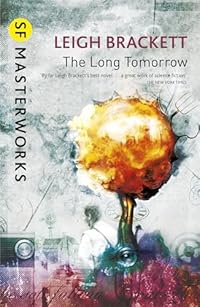The Long Tomorrow by Leigh Brackett
Posted in Reading Reviewed, Science Fiction at 19:00 on 13 October 2016
Gollancz SF Masterworks, 2014, 241 p plus iv p introduction by Pat Cadigan

The Destruction has come, fire has rained down, civilisation has fallen far. Nearly one hundred years on people scrape by as best they can. Society is now dominated by Neo-Mennonites as in the aftermath of the Destruction only those who did not depend on technology had the means to survive. The thirtieth amendment to the US constitution was enacted to forbid both cities and dense populations. The law is backed up by the strict Old Testament religious mind-set which pervades the agrarian culture.
Len Culter is influenced by his grandma who could not quite forget that the old days were good. He is fascinated by her stories and also by the possibility that remnants of the old times might still exist in a place called Bartorstown, whose location no-one knows and whose proponents risk execution. His only hope of ever finding this chimera is via the traders who ply across the land. He is led astray by his cousin Esau, stealer of old books and purloiner from a summarily executed trader’s wagon of a radio which by accident they manage to get to work. On being discovered and forced to flee from Piper’s Run, he and Esau make it to the Ohio riverside settlement of Refuge where a merchant is pushing against the size laws. His endeavour does not turn out well and Len, with Esau and Amity, the girl whom Esau has got pregnant, are plucked from the vengeful zealots by agents of Bartorstown. After a long discouraging journey Len finally reaches his goal where he finds it is much less but also far more than he had expected. He also finds his childhood indoctrination hard to shake off.
From a twenty-first century perspective the absence of any Native Americans in Brackett’s scenario is glaring. It might be thought that they would be equipped to thrive in a world so stripped down. I suppose that in the 1950s when the book was first published such a consideration might not have occurred and would in any case probably have been rejected by an editor – and readers. (A darker explanation for their absence from a future like this is of course also possible; but Brackett’s attention does not lie in that direction. In this context I note that no black characters appear either.) Even though Brackett was one of the (very) few high-profile women SF writers of the 50s the book’s sexual politics are also of its time, with women being depicted as strictly domestic creatures – or temptresses, who are also nevertheless fated to domesticity. (I would also have thought that the US as a polity could not have survived a Destruction as complete as portrayed here. Doubtless, this is also not a thought which would have been comfortable – or perhaps even imaginable – to mid-twentieth century USians. Pat Cadigan in her introduction suggests that a nuclear war would not have been survivable at all.) Still, take it all as read for purposes of story.
Brackett’s characters are convincingly portrayed, it is easy to believe people would behave in the ways shown given their circumstances; only Julio Gutierrez’s breakdown when Bartorstown’s latest attempt to remove the threat overhanging their project failed seemed in any way unlikely. Despite the intervening years since its first publication The Long Tomorrow still bears reading.
Pedant’s corner:- “Pa. hadn’t noticed it” (no need for the full stop after Pa,) proselyting (apparently the USian form of proselytising,) Harkness’ (Harkness’s,) he had waked (woken, please,) “‘Good-by, Len’” (Goodbye, there was another good-by later,) “Dulinsky wiped his face oil his shirt sleeve” (on his shirt sleeve,) Watts’ (Watts’s,) “trailing of tobacco smoke from a pipe” (no need for “of”,) lay low (lie low,) Gutierrez’ (Gutierrez’s.)
